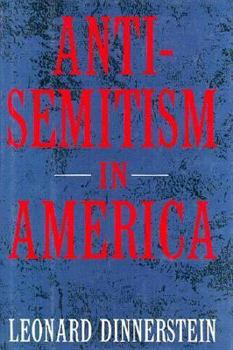Antisemitism in America
Select Format
Select Condition 
Book Overview
Is antisemitism on the rise in America? Did the "hymietown" comment by Jesse Jackson and the Crown Heights riot signal a resurgence of antisemitism among blacks? The surprising answer to both questions, according to Leonard Dinnerstein, is no--Jews have never been more at home in America. But what we are seeing today, he writes, are the well-publicized results of a long tradition of prejudice, suspicion, and hatred against Jews--the direct product of the Christian teachings underlying so much of America's national heritage.
In Antisemitism in America, Dinnerstein provides a landmark work--the first comprehensive history of prejudice against Jews in the United States, ranging from its foundations in European culture to the present day. Dinnerstein's deeply documented book reveals how non-Christians were excluded from voting, for example, in Rhode Island until 1842, North Carolina until 1868, and in New Hampshire until 1877. The Civil War, Dinnerstein writes, brought a new wave of antisemitism as both sides assumed that Jews supported with the enemy. The decades that followed marked the emergence of a full-fledged antisemitic society, as Christian Americans excluded Jews from their social circles. Antisemitic fervor climbed higher after the turn of the century, accelerated by eugenicists, fear of Bolshevism, the publications of Henry Ford, and the Depression. Just before our entry into World War II, the author tells us, it reached a climax, as Father Coughlin attacked Jews over the airwaves (with the support of much of the Catholic clergy) and Charles Lindbergh delivered an openly antisemitic speech to an isolationist meeting. Dinnerstein devotes individual chapters to antisemitism in the South and among African Americans, showing that prejudice among both whites and blacks flowed from the same stream of Southern evangelical Christianity. After the war, with fresh economic opportunities and increased activities by civil rights advocates, antisemitism went into a sharp decline--though it frequently appeared in shockingly high places, including statements by Nixon and his Chairman of the Joint Chiefs of Staff.
"It must also be emphasized," Dinnerstein writes, "that in no Christian country has antisemitism been weaker than it has been in the United States," with its traditions of tolerance, diversity, and a secular national government. This book, however, reveals in disturbing detail the resilience, and vehemence, of this ugly prejudice. Penetrating, authoritative, and frequently alarming, this is the definitive account of a plague that refuses to go away.
In Antisemitism in America, Dinnerstein provides a landmark work--the first comprehensive history of prejudice against Jews in the United States, ranging from its foundations in European culture to the present day. Dinnerstein's deeply documented book reveals how non-Christians were excluded from voting, for example, in Rhode Island until 1842, North Carolina until 1868, and in New Hampshire until 1877. The Civil War, Dinnerstein writes, brought a new wave of antisemitism as both sides assumed that Jews supported with the enemy. The decades that followed marked the emergence of a full-fledged antisemitic society, as Christian Americans excluded Jews from their social circles. Antisemitic fervor climbed higher after the turn of the century, accelerated by eugenicists, fear of Bolshevism, the publications of Henry Ford, and the Depression. Just before our entry into World War II, the author tells us, it reached a climax, as Father Coughlin attacked Jews over the airwaves (with the support of much of the Catholic clergy) and Charles Lindbergh delivered an openly antisemitic speech to an isolationist meeting. Dinnerstein devotes individual chapters to antisemitism in the South and among African Americans, showing that prejudice among both whites and blacks flowed from the same stream of Southern evangelical Christianity. After the war, with fresh economic opportunities and increased activities by civil rights advocates, antisemitism went into a sharp decline--though it frequently appeared in shockingly high places, including statements by Nixon and his Chairman of the Joint Chiefs of Staff.
"It must also be emphasized," Dinnerstein writes, "that in no Christian country has antisemitism been weaker than it has been in the United States," with its traditions of tolerance, diversity, and a secular national government. This book, however, reveals in disturbing detail the resilience, and vehemence, of this ugly prejudice. Penetrating, authoritative, and frequently alarming, this is the definitive account of a plague that refuses to go away.
Format:Hardcover
Language:English
ISBN:0195037804
ISBN13:9780195037807
Release Date:May 1994
Publisher:Oxford University Press, USA
Length:400 Pages
Weight:1.75 lbs.
Dimensions:1.4" x 6.4" x 9.5"
Customer Reviews
2 ratings
An outstanding book
Published by Thriftbooks.com User , 26 years ago
I almost cried many times whie readiing this book. I am just thankful that i grew up in the 1970's-1980's when anti-semetism was at an alltime low. I can only imaging what jews hd to go thri in the first half of this Century. His chapter on black anti-semetism hit it on the head big time. He shows how black anti-semetirsm started an how they are the only group in america today who is still openly anti-semetic. This book is the most definitive book on anti-semetism that i have ever read
Good Reading
Published by Thriftbooks.com User , 27 years ago
Even though this book deals with an unpleasant subject, it is so well written that it is a pleasure to read it. The information contained in the book is valuable and appears to have been thoroughly researched.





